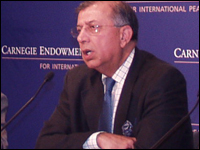Registration
You will receive an email confirming your registration.
IMGXYZ921IMGZYXThe Army is the most powerful political party in Pakistan, asserted Shuja Nawaz, author of Crossed Swords: Pakistan, Its Army, and the Wars Within. With an acceptance rate similar to Ivy League institutions (one out of ten applicants), the army remains the most prestigious institution in Pakistan, and one of the most stable. Pakistan spends 3.4% of its GDP on the military, compared to 1.2% for the social sector; a stark reminder of its economic footprint in a country still struggling with poverty.
Nawaz provide his insights at an event moderated by Ashley J. Tellis, with comments by Polly Nayak, an independent consultant with a longtime interest in South Asia.
Pakistan’s Army – An Insider’s View
Nawaz began by explaining the role of the Pakistani army in the current political environment. General Parvez Kayani plans to take the army back to its professional roots, which did not include political participations. Nawaz warned, however, that if economic conditions worsen, and the country implodes around Kayani, his hand may be forced to intervene in the political process.
Kayani started his tenure by declaring 2008 to be the ‘Year of the Soldier’ and by visiting Federally Administered Tribal Areas (FATA) – the center of counterterrorism operations where General Pervez Musharraf had never set foot. Nawaz explained that because the paramilitary force fighting in FATA is drawn from the local populace rather than the Punjabi dominated Pakistan army, its leadership is reluctant to fight militants with whom they share ethnic ties.
Nawaz emphasized that the Pakistan army is not trained to fight a low-intensity conflict because of the potential for full scale war with India. In his conversations with numerous military officers he hears a common refrain that the U.S. wants Pakistan to not just do more, but to do all. There are 1000 Pakistani posts manning a 1300 mile border with Afghanistan while U.S. and NATO forces cover only 80 posts. The primitive night vision goggles given to them by the U.S. and the still unfulfilled demand for Cobra helicopters make the Pakistan army’s patrolling job that much more difficult, and has created prompted anger among the troops.
On the question of whether the Pakistan army is getting Islamicized, Nawaz cited the changing demographics in the army as the cause rather than an overt ideological indoctrination. In the past, the army was a relatively homogenous entity with 60% of its personnel drawn from rural districts of northern Punjab (Rawalpindi, Jhelum); this number has dropped to 43% today. Officers are now primarily drawn from the urban, conservative areas of central Punjab. In fact, for the first time Karachi has overtaken Jhelum as the city sending most of the new recruits. Nawaz noted that a similar change had taken place in the Zia-ul-Haq period when a ritualistic adherence to religion was enforced in the army.
The Current Government’s Mistakes
Nawaz argued that the current civilian government has made two critical mistakes since coming to power:
First, as history has shown, civilian democratic governments tend to retain and use the autocratic powers of the military dictatorships they succeed. In a move reminiscent of Benazir Bhutto’s changing of the ISI’s Director-General in 1989 to reduce its involvement in domestic politics, the current civilian government tried to place the Inter-Services Intelligence (ISI) under the Interior Ministry, but lost its resolve.
Nawaz suggested that the popular notion of a rogue ISI is incorrect. After years of interacting with ISI officers, he believes the agency has never acted of its own accord when the government did not want it to. Instead, there is often enough ambivalence in the government’s positions that the ISI appears to act independently, providing the government with an element of deniability.
Second, the current government has allowed Islamic political forces to regroup, which is the cause of rising conservatism in the country. This directly impacts the fight against militants, who are now able to recover from recent clashes with soldiers as counterterrorism operations in North West Frontier Province (NWFP) stop for Ramadan. Moreover, Jehadi Sunni militants from Punjab have begun to reinforce al Qaeda’s operations in the hinterland, increasing the pressure on the army.
Looking Forward
|Nawaz argued for a revamping of the top-down political structure in Pakistan for its long term stability; citizens’ democratic impulses are too often thwarted by personality politics. On the army’s future counter-militant efforts, he argued that a 50% Punjabi, 50% Pathan regiment would be more welcome by locals, and have a better chance of being effective in the region. The army must give the civilian government the time and space to establish its authority.
Polly Nayak’s Remarks
Polly Nayak pointed out that the crucial issue facing Pakistan and its army in the fight against terrorism was of national narrative. The idea that it faced a hostile India is deeply embedded in Pakistan’s national identity, and has often provided the rationale for the army’s extraordinary role in the country.
Yet, when faced with the threat of domestic militancy, this narrative is fundamentally challenged. How this new story-line is incorporated into national lore will be the key to Pakistan’s success against terrorism.
A critical question that will determine the success of Pakistan’s democratization is how willing the Pakistan army will be to support its own obsolescence. Nayak questioned whether the army would allow its power to be subsumed.
